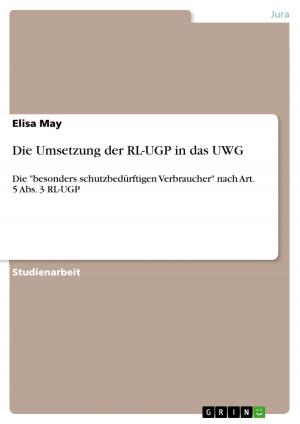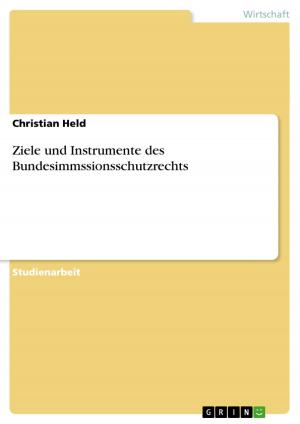The Administrative and Jurisprudential Challenges Affecting the Collection of Zakat by a State
Nonfiction, Reference & Language, Law| Author: | Laila Abdul Latif | ISBN: | 9783668040908 |
| Publisher: | GRIN Verlag | Publication: | September 4, 2015 |
| Imprint: | GRIN Verlag | Language: | English |
| Author: | Laila Abdul Latif |
| ISBN: | 9783668040908 |
| Publisher: | GRIN Verlag |
| Publication: | September 4, 2015 |
| Imprint: | GRIN Verlag |
| Language: | English |
Research Paper (undergraduate) from the year 2012 in the subject Law - Miscellaneous, grade: A, University of Nairobi (School of Law), course: Public Finance and Financial Services Law, language: English, abstract: State controlled zakat collection is the most effective way of collecting zakat. However, this system is not without challenges that inhibit the size of zakat revenue to be realized. These challenges are administrative and jurisprudential. A number of publicists have written several books and articles on the collection of zakat by a state. However none of them have considered the fact that this system faces challenges when it comes to the collection of zakat. This research, therefore, has attempted to add to the existing literature by identifying what these administrative and jurisprudential challenges are that affect the collection of zakat by a state. Muslim scholars have also been identified who have consistently since the time of the Prophet (peace be on him) argued for the collection of zakat by a state, but have failed to discuss that this system may be facing administrative and jurisprudential challenges that limit the revenue collected through zakat. These scholars were more concerned with the philosophies behind arguing a case for the collection of zakat by a state. Consequently, this research took upon the task of investigating through the case study approach what challenges certain selected countries faced in the collection of zakat, and whether these challenges are administrative and jurisprudential in nature and accordingly pointed out some recommendations that would aid in overcoming the identified challenges.
Laila Abdul Latif is a corporate and litigation lawyer with Rachier & Amollo Advocates in Kenya. She holds a first class undergraduate law degree from the University of Nairobi, a Master of Laws in Public Finance and Financial Services Law from the same university and a Master of Arts in Development and Governance from the University of Duisburg-Essen in Germany. She has also trained with the University of Münster in Germany on international taxation. Her research areas focus around tax practices and their impact on African economies, Islamic law and finance, administrative law as well as developing a financing framework for the right to health for the African continent. She has a wide range of international experience having researched for the European Commission and the World Health Organisation. She has widely published on tax and issues surrounding the right to health. Lately, she is focusing on development and governance concerns in the African continent.
Research Paper (undergraduate) from the year 2012 in the subject Law - Miscellaneous, grade: A, University of Nairobi (School of Law), course: Public Finance and Financial Services Law, language: English, abstract: State controlled zakat collection is the most effective way of collecting zakat. However, this system is not without challenges that inhibit the size of zakat revenue to be realized. These challenges are administrative and jurisprudential. A number of publicists have written several books and articles on the collection of zakat by a state. However none of them have considered the fact that this system faces challenges when it comes to the collection of zakat. This research, therefore, has attempted to add to the existing literature by identifying what these administrative and jurisprudential challenges are that affect the collection of zakat by a state. Muslim scholars have also been identified who have consistently since the time of the Prophet (peace be on him) argued for the collection of zakat by a state, but have failed to discuss that this system may be facing administrative and jurisprudential challenges that limit the revenue collected through zakat. These scholars were more concerned with the philosophies behind arguing a case for the collection of zakat by a state. Consequently, this research took upon the task of investigating through the case study approach what challenges certain selected countries faced in the collection of zakat, and whether these challenges are administrative and jurisprudential in nature and accordingly pointed out some recommendations that would aid in overcoming the identified challenges.
Laila Abdul Latif is a corporate and litigation lawyer with Rachier & Amollo Advocates in Kenya. She holds a first class undergraduate law degree from the University of Nairobi, a Master of Laws in Public Finance and Financial Services Law from the same university and a Master of Arts in Development and Governance from the University of Duisburg-Essen in Germany. She has also trained with the University of Münster in Germany on international taxation. Her research areas focus around tax practices and their impact on African economies, Islamic law and finance, administrative law as well as developing a financing framework for the right to health for the African continent. She has a wide range of international experience having researched for the European Commission and the World Health Organisation. She has widely published on tax and issues surrounding the right to health. Lately, she is focusing on development and governance concerns in the African continent.















